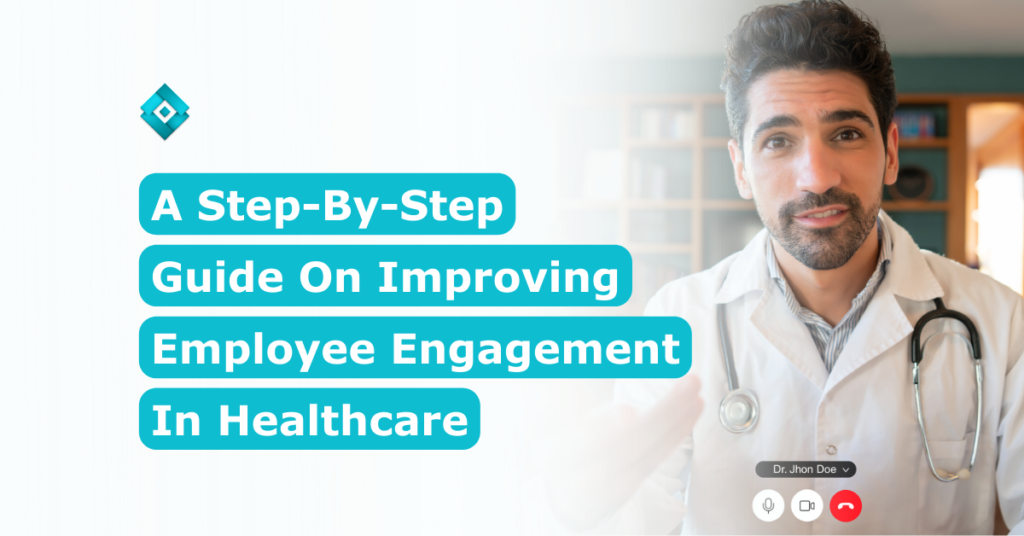Why do you need these steps on improving employee engagement in healthcare teams?
With the number of healthcare workers leaving their job, you need help in improving employee engagement in healthcare offices. This is because employee engagement plays a pivotal role in the success of any healthcare organization. Truly, engaged healthcare professionals are more motivated, productive, and committed to providing high-quality patient care. In an industry where patient well-being is paramount, fostering a culture of employee engagement is crucial. Overall with your top notch team, you can start achieving better patient outcomes and overall organizational success.
In this blog, we will delve into a comprehensive guide on improving employee engagement in healthcare. Accordingly, this will result in a more fulfilled and effective workforce.
Follow these steps on improving employee engagement in healthcare!

1. Cultivate a positive work environment.
A positive work environment is the foundation of employee engagement. Thus, you should prioritize creating a culture that values open communication, collaboration, and mutual respect. To do this, you must first encourage constructive feedback and recognize employees for their efforts and achievements. Further, establishing a positive work environment fosters a sense of belonging. Lastly, this encourages employees to take ownership of their roles in providing exceptional patient care. Doing all these is all part of improving employee engagement in healthcare.

2. Support professional development.
Investing in employee professional development demonstrates a commitment to their growth and success. To show your support to your employees, start offering training programs and workshops. Additionally, include continuing education opportunities to help healthcare professionals enhance their skills and knowledge. In effect, these personal growth opportunities will improve employee engagement. Further, it will equip the workforce with the tools they need to adapt to the evolving healthcare landscape.

3. Provide adequate resources and technology.
Efficient healthcare delivery requires access to modern technology and sufficient resources. For this reason, ensure that your team has access to the latest medical equipment, advanced healthcare software, and adequate staffing. In contrast, outdated technology or a lack of resources can lead to frustration and reduced engagement among employees. If you want to start improving employee engagement in healthcare, then this is the way. By providing the necessary tools and resources, healthcare organizations empower their staff to perform at their best.

4. Foster a sense of purpose.
To start improving employee engagement in healthcare teams, you must always instill within your team the reason why they started. Moreover, emphasize the meaningful impact that they have on patients’ lives. Equally important is to remind your team of the importance of their roles in improving outcomes and enhancing patient experiences. Altogether, cultivating a strong sense of purpose in the workplace can motivate employees to go above and beyond. In effect, this leads to increased engagement and job satisfaction.
Click here to know the 9 Recurring Tasks Performed By A Virtual Medical Assistant!

5. Encourage work-life balance.
In the demanding healthcare industry, maintaining a healthy work-life balance is crucial for employee well-being and engagement. This is especially important if improving employee engagement in healthcare is your goal. Accordingly, you should implement policies that promote work-life balance. Certainly, this includes policies such as flexible scheduling, paid time off, and telecommuting options. Ultimately, by supporting employees in balancing their personal and professional lives, you can demonstrate a commitment to their overall well-being.

6. Recognize and reward achievements.
Recognizing and rewarding employee achievements is crucial for improving employee engagement. Truly, it’s a powerful driver that motivates staff to continue delivering quality service and making meaningful contributions to patient care. Consequently, a formal recognition program that highlights outstanding performance, compassion, and innovative thinking goes a long way in this regard.
By acknowledging hard work and dedication, you strengthen staff morale and nurture a culture of excellence. Moreover, celebrating employee achievements serves as a powerful motivator, inspiring others to rise to the occasion. All in all, it’s clear that implementing a formal recognition program can drive employee engagement and improve overall performance.

7. Promote team building and collaboration.
Strong teamwork and collaboration are essential in healthcare settings. Without these two, it would be difficult to start improving employee engagement in healthcare teams. With this in mind, encourage team-building activities. Also, create opportunities for healthcare professionals to collaborate on patient care initiatives.
A collaborative environment fosters trust, enhances problem-solving skills, and improves communication among employees. When your team feels part of a cohesive team, their engagement and job satisfaction naturally increase.

8. Listen to employee feedback.
Reading the concerns of your team is vital for understanding the challenges and concerns faced by healthcare professionals. So, implement regular surveys or feedback sessions to gauge employee satisfaction and identify areas for improvement. Next, act on the feedback received, and involve employees in decision-making processes when possible. Ultimately, demonstrating a commitment to addressing their concerns can significantly increase employee engagement and loyalty.

9. Provide mental health support.
Investing in employee wellbeing is not just a moral necessity, but also a strategic one. It is one of the most important ones in improving employee engagement in healthcare teams. Certainly, the emotional demands of the job can be overwhelming. In effect, healthcare workers are at risk of experiencing high levels of stress and burnout. Thus, organizations that prioritize the mental health of their staff can reap the benefits of an engaged and productive workforce.
You can achieve this by offering access to counseling services, stress management programs, and resilience training. Additionally, create a supportive environment that addresses the mental health needs of employees. As a result, you can help employees develop the skills and resources they need to cope with the demands of their jobs. This can improve employee engagement and ultimately, improve the quality of care provided to patients.
Are you ready to take on these strategies on improving employee engagement in healthcare?
Increasing employee engagement in healthcare is not only essential for creating a fulfilling work environment. It also directly impacts patient care and overall organizational success. By cultivating a positive work environment, you can empower your employees to deliver exceptional patient care. Additionally, recognizing achievements, encouraging work-life balance, and promoting collaboration contribute to a cohesive and engaged workforce.
Delegate your tasks to our Virtual Medical Assistants!
As a healthcare provider, your top priority is delivering exceptional care to your patients. However, the administrative tasks that come with running a medical practice can take up valuable time. For this reason, you are prevented from dedicating your full attention to patient care. That’s where our Virtual Medical Assistants come in. They are dedicated professionals with experience in the healthcare industry and certified in HIPAA regulations.
By delegating your administrative tasks to our team, you can focus on what matters most: providing care to your patients. Our Virtual Medical Assistants are here to support you and help you succeed! Start seeing results for your practice today by choosing to work with our team. Book a discovery call by clicking here now!








